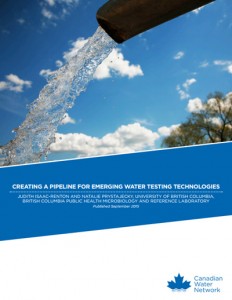Innovation to Application: Creating a Pipeline for Validation and Uptake of Emerging Water Testing Technologies
Principal Investigator - Judy Isaac-Renton, Professor, University of British Columbia; Public Health Laboratory Director, Britis, 2011 - 2014

Challenge
Current tests to assess microbial water quality use century-old techniques that are insufficient to fully protect the health of a community. These tools are slow, unreliable, and expensive. Classic indicators of microbial water quality – the coliform group and Escherichia coli (E-Coli) – are insufficient to fully protect public health. Many new technologies are being developed for water quality assessment, which have the potential to revolutionize the water quality industry. However, there has been limited uptake in industry, especially for microbial water quality testing – given that water testing requires extensive validation, and is hampered by the requirements of an intense regulatory environment.
The need for novel microbial monitoring tools across Canada to prioritize multi-barrier protection of water supplies is clear; however, Canada lacks a mechanism to facilitate and accelerate uptake by industry.
This work, led by Dr. Judy Isaac-Renton working closely with Dr. Natalie Prystajecky and their partners, aims to address the need for such a mechanism by creating and piloting a Microbial Test Translation Pipeline that will enable rigorous validation of microbial water quality monitoring processes.
Project
The objective of this work is to improve the uptake of the next generation of water monitoring tests by the Canadian water community within a context of evaluative rigor and ongoing dialogue. The project will create and pilot a Microbial Test Translation Pipeline (MTTP), where raw scientific knowledge and early testing prototypes can be rigorously validated for reliability and practicality for microbial water quality monitoring and investigation.
The pipeline will create linkages between test end-users and test creators. Core public laboratories are partnering with knowledge generators (predominantly university researchers) to evaluate and validate microbial water quality testing innovations. Upon evaluation, validated and simplified tests will be made available for pilot purposes to end users, including testing laboratories and watershed sites. The team will work closely with regulators in health and environment ministries at both the federal and provincial levels, to evaluate needs as well as barriers to uptake.
The pipeline process will consist of four steps:
1. A paper-based evaluation of the appropriateness of promising novel tests,
2. A laboratory verification study of the tests,
3. An inter-laboratory evaluation study to determine performance of the novel assay between laboratories, performance characteristics, and operational limits of the test including specificity, and limits of detection (LOD) against the appropriate gold-standard test(s), and
4. A draft report to enable dialogue with knowledge end-users.
This work will develop a rigorous test validation pipeline protocol including processes and procedures to evaluate novel technologies within a laboratory quality framework. This work will provide unbiased analytical and statistical evidence of test performance, including determining the sensitivity, specificity, limits of detection, and other performance measures for each technology.
Outputs
Researchers have participated and contributed to several workshops and meetings:
- Hosted a series of team teleconferences to mobilize research efforts and work through research methods and outcomes.
- Hosted a workshop on Social Science Methods, including stakeholder outreach, in December 2012 in Vancouver, BC.
- Developed a consortium of researchers that included representatives from two provincial public health laboratories (BC and ON), a federal public health laboratory (National Microbiology Laboratory, Public Health Agency of Canada), a federal environmental laboratory (National Water Research Institute, Environment Canada) and a university laboratory (Department of Engineering, École Polytechnique). This represents a wide breadth of laboratory types interested in water quality testing.
To disseminate findings, researchers have participated in several presentations:
- Isaac-Renton J. 2012. Ripples of change: Need for vigilance. American Academy for the Advancement of Science (AAAS). Public Forum on Water Security, Vancouver, BC. (February 17, 2012).
- Cook C, Prystajecky N and Isaac-Renton J. 2012. Moving microbial water quality forward: integrating molecular methods for water quality testing into legislative frameworks. Assembly of First Nations Water Conference. Edmonton, AB. (March 7, 2012)
- Prystajecky N. 2012. Microbial indicators – what they can and can’t tell us. BC Water and Wastewater Association Annual Meeting, Penticton, BC. (April 24, 2012)
- Prystajecky N, Cook C and Isaac-Renton J. 2012. A brand new(ish) world: Molecular testing for microbial water assessment. Canadian Water and Wastewater Association – 15th Canadian National Conference and 6th Policy Forum on Drinking Water, Kelowna, BC (Oct 21-24, 2012).
- Ngueng Feze IN, Prystajecky N, Isaac-Renton J, Cook C, Joly Y, Dunn G, Kirby E, Knoppers BM and Ozdemir V. 2013. The regulatory frameworks of novel molecular water testing biotechnologies in North America. 2nd Biotechnology World Congress, Dubai. (February 18-21, 2013).
Work to date on this project has resulted in scholarly journal publications:
- Cook et al. (submitted to Canadian Water Research Journal) review literature and legislation to explore, analyze and understand the current legislative frameworks in three Canadian provinces and identifies barriers to implementing molecular tests for drinking water.
- Ngueng-Feze et al. (submitted to Ottawa Law Review) builds upon our first paper and reviews the policies for testing drinking and source water, as well as any current guidance on introducing new methods. It concludes that introduction of new tests in Canada is complex based on the fragmentation of the water management landscape.
Outcomes
Anticipated outcomes include:
- The Microbial Test Translation Pipeline (MTTP) will allow emerging microbial detection technologies to be more rapidly translated from innovation to application.
- Changes in practice as the results of studying three of Canada’s recently developed novel testing methods are expected to provide tools for better watershed management and monitoring.
- The unbiased information on performance of the new tests will help end users such as laboratories and regulators to apply these methods on a more consistent basis with confidence, and the MTTP may ultimately aid in improving the reliability, speed and cost of microbial water quality monitoring.





